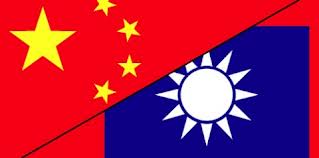Weeks after the Dominican Republic switched its diplomatic allegiance from Taiwan to China, Burkina Faso—one of Taiwan’s last remaining African allies—has done the same. This move comes after the West African nation pledged in early 2017 to stick by Taipei, reportedly refusing a hefty investment offer from Beijing, and as China has been increasingly leveraging its economic and diplomatic clout to put pressure on Taiwan—a self-governed nation that Beijing considers an “inalienable part of China.” At NPR, Rob Schmitz reports on Burkina Faso’s cutting of ties with Taiwan, and notes Beijing’s recent use of economic, diplomatic, and military strategy to isolate Taiwan:
Taiwan lost another ally on Thursday. The West African country Burkina Faso became the latest country to cut ties with the island. After the Dominican Republic, that’s two in less than one month. And like other countries, including the United States, that for decades have broken diplomatic relations with Taiwan, they did so for one reason: to please China.
The Chinese government refuses to maintain diplomatic relations with any nation that recognizes Taiwan and has long pressured countries to sever ties with the island.
[…W]hile China has long used diplomatic and commercial might to isolate Taiwan, it has also recently displayed its military strategy. Last month, China conducted a live-fire drill in the Taiwan Strait for the first time in two years. That was soon followed by bombers, surveillance aircraft, and fighter jets from China’s air force that have been circling Taiwan on a semiregular basis in recent weeks.
But military experts offer different takes on what it may mean: some view the drills as routine exercises, but others say this could be a glimpse of future plans for invasion. […] [Source]
Over less than 20 years, 14 countries have severed formal diplomatic ties with Taiwan. Following the severing of diplomatic ties with Burkina Faso and the Dominican Republic, only 18 countries (including the Vatican) have official relations with Taiwan.
At CNN, Bard Wilkinson reports on Taipei’s reaction to Burkina Faso’s severing of relations:
Taiwan’s President Tsai Ing-wen accused China of “serial acts of suppression” and “dollar diplomacy” after Burkina Faso became the second country in a month to break off diplomatic ties with the island in favor of Beijing.
[…] “This is a warning to the Chinese government: This behavior is detrimental to cross-strait relations and China’s international image, and does nothing to ease the international community’s concerns about China,” President Tsai told reporters in an unusually strongly worded statement late Thursday.
“China’s suppression will only make Taiwan’s partnerships in the international community even closer. We will never give in,” she added.
[…] Taiwan Foreign Minister Joseph Wu said he had offered his resignation to President Tsai. He added that his country will also halt all bilateral cooperative projects, cut all assistance to Burkina Faso, and pull out its diplomatic staff and technical missions from the African country. […] [Source]
Since the landslide election of pro-independence candidate Tsai Ing-wen as president of Taiwan in January 2016, Beijing has been steadily ramping up pressure on the island. Months after Tsai’s win, China suspended communication with Taipei. Beijing has also increased its assertion of pressure on corporate entities to reinforce its claim to the de facto independent island nation. This week, Chinese authorities issued a fine for Japanese retailer MUJI for listing Taiwan as the country of origin for some products sold in China. Earlier this month, U.S.-based clothing company Gap issued an apology to China for printing a t-shirt with a map of China that didn’t include Taiwan, parts of Tibet, and islands in the South China Sea claimed by Beijing after Chinese social media users drew attention to the product. Last month, China’s Civil Aviation Authority issued a letter to 36 foreign airlines calling for them to reclassify Taiwan (as well as Hong Kong and Macao) as territories under Beijing’s sovereignty. The White House dismissed the letter as “Orwellian nonsense and part of a growing trend by the Chinese Communist Party to impose its political views on American citizens and private companies.” While many foreign airlines have followed suit, major American airlines have not.
At the South China Morning Post, Choi Chi-yuk cites Taiwan’s former deputy minister of the Mainland Affairs Council stressing the need to bolster ties with Washington in the face of increased hostility from China:
Taiwan will have to try to get closer to Washington in the face of increased pressure from mainland China, a former minister from the island has warned.








